No series in horror cinema has endured as long as the Universal Monster classics of the 1930s and ’40s – a time marked by the Great Depression, the rise of Hitler’s Germany and America’s eventual involvement in WWII. At the outset, the Universal films were hugely successful with audiences seeking an escape, but by the time the U.S. became embroiled in the conflict, the popularity of the studio’s trademark monsters became less inviting to viewers, who turned their attention to war-time enemies as the cinematic nemesis of choice. Before that happened, however, Universal established a litany of Monster Classics that would inspire long-running franchises and become favorites of viewers for generations to come.
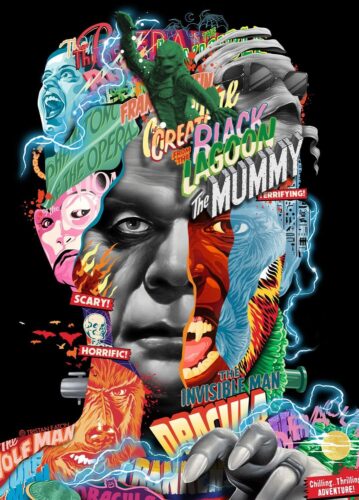 Universal has released the “big” eight entries in the Monsters franchise – the initial FRANKENSTEIN, DRACULA, MUMMY, INVISIBLE MAN, PHANTOM OF THE OPERA, WOLF MAN, and CREATURE FROM THE BACK LAGOON entries plus THE BRIDE OF FRANKENSTEIN – on 4K UHD over the last couple of years in two separate box-sets. This month, the studio has released a UNIVERSAL MONSTERS LIMITED EDITION 4K UHD package – the first release that combines all the current UHD Monsters titles in a limited (numbered to 5,500 units) set featuring eye-popping art from acclaimed artist Tristan Easton.
Universal has released the “big” eight entries in the Monsters franchise – the initial FRANKENSTEIN, DRACULA, MUMMY, INVISIBLE MAN, PHANTOM OF THE OPERA, WOLF MAN, and CREATURE FROM THE BACK LAGOON entries plus THE BRIDE OF FRANKENSTEIN – on 4K UHD over the last couple of years in two separate box-sets. This month, the studio has released a UNIVERSAL MONSTERS LIMITED EDITION 4K UHD package – the first release that combines all the current UHD Monsters titles in a limited (numbered to 5,500 units) set featuring eye-popping art from acclaimed artist Tristan Easton.
On the disc side, the movies are presented in the same 4K remasters (1.37 B&W, high bit-rate HVEC endcodes) as the earlier UHD boxes, enhanced with HDR10 and the same supplements that have graced previous releases of these films.
Looking at Tod Browning’s 1931 DRACULA (75 mins.) is virtually like gazing upon the Bela Lugosi classic for the first time, as HDR and a new 4K transfer enhance the details and deep contrast levels of this fresh remaster, which is indeed darker but more nuanced than its Blu-Ray counterpart. The movie is best remembered for its opening Transylvanian set-piece that introduces viewers to Lugosi’s unforgettable count, and while the London sequences tend to be static and dull by comparison, the increased detail seen here in the UHD presentation even makes the talky, later sections of the picture more interesting. The DTS MA mono sound is nearly crackle-free, and Philip Glass’ Kronos Quartet score (which makes the stilted drawing room sequences a bit livelier at least) is also available in Dolby Digital stereo.
Supplements include two commentary tracks reprised from prior editions: an authoritative discussion by historian David J. Skal and a later talk with Steve Haberman (screenwriter of the awful Mel Brooks spoof “Dracula: Dead and Loving It”), both offering enlightening analysis and artistic commentary on the film; “The Road to Dracula” (35 mins.), hosted by Carla Laemmle, returns here from its original DVD appearance, as does the still gallery “Dracula Archives” (8 mins.), while “Lugosi: The Dark Prince” (36 mins.), a carry-over from the 75th Anniversary DVD, sports interviews with historians and directors including Joe Dante who pay tribute to Lugosi’s career. Trailers are included for the whole Universal “Dracula” series (Dracula, Dracula’s Daughter, Son of Dracula and House of Dracula), and an eight-minute restoration featurette (HD) includes a look at the studio’s efforts to restore both the English and Spanish language versions as a part of their centennial efforts, noting that a portion of the Spanish “Dracula” had to be taken from an international print as the studio’s negative was badly damaged during the third reel. Speaking of the Spanish “Dracula,” it too has been lovingly restored here in a new 4K UHD encode that’s perhaps not quite as crisp as the Lugosi version, even if the elements seem to be, on balance, in healthier condition. An optional introduction with star Lupita Tovar is included as well.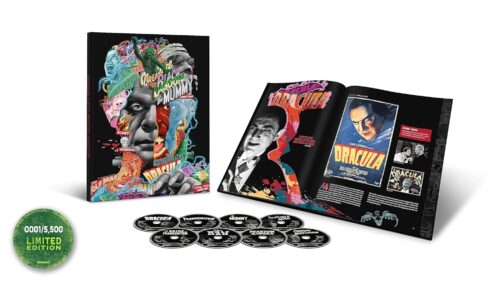
James Whale’s FRANKENSTEIN (71 mins.) introduced viewers to Boris Karloff in his legendary role as the Frankenstein monster, and while the film remains a striking work for its 1931 release date, it pales in comparison to “The Bride of Frankenstein,” its acclaimed 1935 sequel. Minus Franz Waxman’s classic score, the 1931 original isn’t as playful or inventive as Whale’s brilliant follow-up, but it’s still an effective early horror outing that introduces us to “Karloff” from Hollywood’s Golden Age.
“Frankenstein” once again includes a number of supplements carried over from prior releases: “The Frankenstein Files” is an engaging 45-minute account of picture’s production and legacy; “Karloff: The Gentle Monster” (36 mins.) is a carryover from the 75th Anniversary release; “Frankenstein Archives” is another 10-minute assortment of stills; “Boo!” is a fun 1932 Universal “Brevity”; commentaries are provided by Rudy Behlmer and Sir Christopher Frayling; and a full trailer gallery boasts the original coming attractions for Frankenstein, Bride of Frankenstein, Ghost of Frankenstein, Frankenstein Meets the Wolf Man and House of Frankenstein. Also present on the “Frankenstein” disc is Kevin Bronlow’s fine 1998 TCM documentary, “Universal Horror.” This examination of the beginnings of Universal’s monster franchises is narrated by Kenneth Branagh and offers ample vintage footage, interviews and an entertaining look into the genre’s origins.
In between “Frankenstein” pictures, James Whale helmed a magnificent adaptation of H.G. Wells’ THE INVISIBLE MAN (71 mins.), a 1933 classic that, in certain ways, holds up better than any of Universal’s earliest genre outings for sheer dramatic impact. Claude Rains gives a memorable performance as a scientist who slowly goes mad after an experiment renders him invisible – a portrayal that relies heavily on his voice since Rains is only on-screen for a few minutes. John P. Fulton’s visual effects, especially for their era, are superb, and Gloria Stuart believably renders Rains’ sympathetic girlfriend.
Arguably the healthiest looking of the original, early ‘30s Universal Monsters classics, “The Invisible Man” appears in top form with this new HDR-enhanced HVEC transfer – there’s still a bit of filtering present in some sequences (like “The Mummy,” some scenes seem to be affected more than others), but on balance the transfer is exceptionally good for any film of its vintage. Special features include the original DVD doc, “The Invisible Man Revealed” (35 mins.) plus production photographs, trailers for the Invisible Man series, and commentary by Rudy Behlmer.
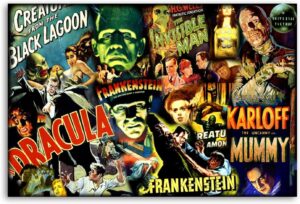 Scripted by Curt Siodmak, Universal’s 1941 favorite THE WOLF MAN (70 mins.) stars Lon Chaney Jr. as Larry Talbot, who becomes cursed with the fate of a werewolf after wandering in the forests of Wales and being bitten by one of the creatures. Claude Rains plays Talbot’s father, and the supporting cast includes Maria Ouspenskaya and Bela Lugosi as the Gypsies who predict Talbot’s fate, along with Evelyn Ankers as his love interest and additional supporting turns from Ralph Bellamy and Patric Knowles. The settings, atmosphere, and direction (by George Waggner) are all top-notch and the movie compares favorably with the Universal chillers of the period.
Scripted by Curt Siodmak, Universal’s 1941 favorite THE WOLF MAN (70 mins.) stars Lon Chaney Jr. as Larry Talbot, who becomes cursed with the fate of a werewolf after wandering in the forests of Wales and being bitten by one of the creatures. Claude Rains plays Talbot’s father, and the supporting cast includes Maria Ouspenskaya and Bela Lugosi as the Gypsies who predict Talbot’s fate, along with Evelyn Ankers as his love interest and additional supporting turns from Ralph Bellamy and Patric Knowles. The settings, atmosphere, and direction (by George Waggner) are all top-notch and the movie compares favorably with the Universal chillers of the period.
Once again, a new, fine-grain 4K remaster graces this Universal presentation with bountiful extras, highlighted by David J.Skal’s “Monster by Moonlight” documentary, a DVD carryover hosted by John Landis, which is an engaging look into the Wolfman’s creation and phenomenon as the last great character to originate from Universal’s “Golden Age” horror cycle. Eschewing the testimony of countless historians (as were utilized in Skal’s other documentaries) in favor of interviews with make-up artist Rick Baker (who discusses Jack Pierce’s lasting legacy) and screenwriter Siodmak, the program is entertaining and enlightening, even though it uses a generous selection of film clips from the Wolfman’s subsequent cinematic appearances to round out the program. Of special interest to film music fans will be the discussion of “The Wolf Man”’s musical score by Frank Skinner, Hans Salter, and Charles Previn, which is given a few minutes of analysis in the documentary by John Morgan and conductor William Stromberg. Morgan notes how most film scores today consist of musical wallpaper while Stromberg discusses one particular cue that had been cut down in editing, where Talbot watches a Gypsy burial. The “Archives” section also contains an abundance of still-frame photographs and publicity shots, underscored by the original music without dialogue.
Universal authority Tom Weaver’s insightful commentary also returns, along with the eight-minute “The Wolf Man: From Ancient Curse to Modern Myth” (10 mins.) and the 2009 effort “Pure in Heart” (37 mins.), a loving tribute to Lon Chaney, Jr., with historian Gregory Mank, Rick Baker, Joe Dante, Kim Newman and others paying respect to the original Larry Talbot. Trailers for Werewolf of London, The Wolf Man, Frankenstein Meets the Wolf Man, House of Frankenstein, House of Dracula and She-Wolf of London round out the disc, which also includes the Jack Pierce documentary “He Who Made Monsters.”
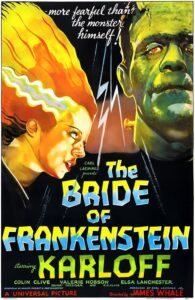 THE BRIDE OF FRANKENSTEIN (75 mins.) obviously requires little introduction: this 1935 James Whale-helmed sequel was graced with a spectacular Franz Waxman score that shows, in the space of four short years, how quickly movie-making had progressed as a medium. Whale’s playful, inventive direction, the performances of Karloff, Colin Clive and Elsa Lanchester, and that Waxman score – one of the all-time greats – are unforgettable aspects of a film many regard as the finest in the pantheon of Universal Monsters.
THE BRIDE OF FRANKENSTEIN (75 mins.) obviously requires little introduction: this 1935 James Whale-helmed sequel was graced with a spectacular Franz Waxman score that shows, in the space of four short years, how quickly movie-making had progressed as a medium. Whale’s playful, inventive direction, the performances of Karloff, Colin Clive and Elsa Lanchester, and that Waxman score – one of the all-time greats – are unforgettable aspects of a film many regard as the finest in the pantheon of Universal Monsters.
As with the other transfers included here, “Bride of Frankenstein” offers what you’d anticipate from a film of its vintage on UHD: slightly more detail, superior compression, and a wider contrast than the studio’s previous Blu-Ray, thanks to a subtle, not overpowering HDR10 grading. The larger and more capable your TV, the better in order to appreciate the enhancement, while the disc’s mono soundtrack is the same as its previous high-def release (also included here, alongside the UHD). Extras include the original DVD documentary, “She’s Alive! Creating ‘Bride of Frankenstein,’” plus a stills archive, commentary with historian Scott MacQueen, and trailers.
In 1932, “Dracula” cinematographer Karl Freund helmed the first appearance of what would ultimately become – thanks to both a handful of sequels and a contemporary series of modern fantasy films – the most durable of Universal’s monsters, THE MUMMY (74 mins.). Boris Karloff here carved out his second iconic studio role as Imhotep, who lusts after Zita Johann in an entertaining – if somewhat creaky – film with unforgettable imagery (though ironically, Karloff only appears in the patented Mummy make-up for a couple of minutes).
“The Mummy”’s previous Blu-Ray was a bit uneven in its overall visual appearance, with some occasional filtering on-hand – issues addressed here by Universal’s vastly superior 4K UHD, which accentuates the film’s overall level of detail while again adding contrast enhancements via HDR10. It’s a solid upgrade, while extras include “Mummy Dearest” (30 mins.), a documentary from the original DVD release; “He Who Made Monsters” (24 mins.), a Jack Pierce retrospective; “Unraveling the Legacy of The Mummy” (8 mins.), a brief featurette from the 75th Anniversary DVD; “The Mummy Archives” still gallery; commentaries by Paul M. Jensen and a more recent track with Rick Baker, Scott Essman, Steve Haberman, Bob Burns and Brent Armstrong; and trailers for all the “Mummy” films.
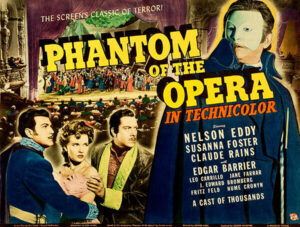 The sole Technicolor offering in the Universal Monsters filmography – and arguably the biggest upgrade to be found in this new 4K UHD set – is PHANTOM OF THE OPERA (89 mins.), the studio’s lavish, operatic 1943 take on Gaston Leroux’s novel with an accent on the love story courtesy of director Arthur Lubin. Claude Rains is the Phantom to Susanna Foster and Nelson Eddy’s romantic leads; it’s a sturdy, if unspectacular, film that here receives a dynamic HDR10 grading on 4K UHD, easily surpassing the last Blu-Ray release of the picture in every way, from its colors to its level of detail. Extras include the lengthy 51-minute DVD documentary “Phantom Unmasked,” plus Scott MacQueen’s commentary and the trailer.
The sole Technicolor offering in the Universal Monsters filmography – and arguably the biggest upgrade to be found in this new 4K UHD set – is PHANTOM OF THE OPERA (89 mins.), the studio’s lavish, operatic 1943 take on Gaston Leroux’s novel with an accent on the love story courtesy of director Arthur Lubin. Claude Rains is the Phantom to Susanna Foster and Nelson Eddy’s romantic leads; it’s a sturdy, if unspectacular, film that here receives a dynamic HDR10 grading on 4K UHD, easily surpassing the last Blu-Ray release of the picture in every way, from its colors to its level of detail. Extras include the lengthy 51-minute DVD documentary “Phantom Unmasked,” plus Scott MacQueen’s commentary and the trailer.
Last but (arguably) not least, the Universal Monsters era came to a close with the release of 1954’s CREATURE FROM THE BLACK LAGOON (80 mins.), the sci-fi fave included here not only in its 2-D version, newly restored in 4K UHD, but a sparkling 3-D home video release (on Blu-Ray) as well. For 3-D enthusiasts, being able to see the film in pure three-dimensional form – and not an anaglyph 3-D version like we used to see on TV back in the ‘80s – is a revelation. Both occasional pop-out effects and depth-of-field photography add immeasurably to visuals that are often flat and uninspired otherwise. In fact, seen in its native 3-D format, effects and shots which otherwise look awkwardly (or routinely) framed make visual sense, and the overall experience enhances Jack Arnold’s ‘50s monster mash as a result.
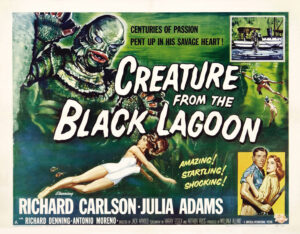 Still, since 3DTV usage is dwindling, more fans are likely to check out Universal’s 4K UHD presentation, which is one of the healthiest and most detailed of the group here, unsurprising since the film is of a relatively more recent vintage. Transitions utilizing opticals still seem a bit blurry, as expected, but the image on the whole enhances the “flat,” 2-D version of the picture on UHD. Extras on the “Creature” platter include “Back to the Black Lagoon” (40 mins.), a DVD retrospective, plus Tom Weaver’s fascinating commentary, trailers for the Gill Man series, and production photographs.
Still, since 3DTV usage is dwindling, more fans are likely to check out Universal’s 4K UHD presentation, which is one of the healthiest and most detailed of the group here, unsurprising since the film is of a relatively more recent vintage. Transitions utilizing opticals still seem a bit blurry, as expected, but the image on the whole enhances the “flat,” 2-D version of the picture on UHD. Extras on the “Creature” platter include “Back to the Black Lagoon” (40 mins.), a DVD retrospective, plus Tom Weaver’s fascinating commentary, trailers for the Gill Man series, and production photographs.
All eight discs are housed in an oversized package similar to Criterion’s “Godzilla: The Showa Era Films” “long-box” release. Its pages include trivia notes and Tristan Easton’s impressive art design. Unlike so many efforts over the years that embrace “revisionist” artwork for catalog releases, Easton – who created individual murals of the Monsters for Universal back in 2019 – manages to mix “respectful retroism” (incorporating original poster designs, photos and art work) with a colorful, contemporary approach. The result is something that I really dug, and lends a great deal of appeal to the set as a display piece.
A Digital HD copy, good for all the movies, rounds out a fetching presentation from Universal, with hopefully the prospects of more Monsters to follow in the near future on UHD.
 Also New on 4K UHD
Also New on 4K UHD
DARKMAN 4K UHD/Blu-Ray (96 mins., 1990, R; Shout! Factory): Sam Raimi’s first “studio film” is an entertaining comic-book hybrid of “Batman” and “Phantom of the Opera,” as light as a feather but bursting with cinematic energy.
Liam Neeson plays a research scientist who’s horribly disfigured after a local gangster (Larry Drake) destroys his laboratory while searching for documents that would be incriminating for his shady land-developer boss (Colin Friels). Neeson is presumed dead but, thanks to the miracle of modern science, becomes an anonymous test subject for a hospital that keeps him alive — giving him the ability to avoid feeling pain while experiencing stronger emotions. After escaping from the operating table, Neeson’s scientist finds that his synthetic skin allows him to recreate his prior appearance as well as take on the forms of his enemies, provided he only stays in the sunlight for 99 minutes while “Darkman” exacts his revenge.
As much of a homage to the Universal monster movies of the ‘30s and ‘40s as it was influenced by the comic book films of its time (like “Batman” and “Dick Tracy,” albeit both released after “Darkman” finished filming), the gothic “Darkman” was a surprise sleeper hit in the summer of 1990 (produced for $16 million, it grossed more than twice that amount domestically), and established Raimi — best known for his “Evil Dead” films — as a player on the studio circuit. The screenplay (credited to Raimi, Ivan Raimi, Chuck Pfarrer, Daniel Goldin and Joshua Goldin) is a pastiche of the comic book and horror genres, and in another director’s hands could’ve been just a standard-issue revenge picture.
Thanks to Raimi, though, “Darkman” is bursting with visual pizzaz, pulsating montages, humor, and over-the-top melodramatic moments, punctuated by a terrific — and appropriately bombastic — Danny Elfman score that’s among the best of his genre works of the period. He also receives strong support from Neeson and Frances McDormand (as his lawyer-lady love), who give the film a touch of class in roles atypical for both performers. (There are also cameos from Jenny Agutter to John Landis and a particularly fitting one for a certain Raimi favorite as well at the very end).
Universal’s first Blu-Ray of “Darkman” was a DNR’d mess – so scrubbed and filtered that it nearly looked like a standard-def upscale (a prior HD-DVD edition was, at least, superior, and not as affected by the DNR Universal applied). Shout issued a Blu-Ray in 2014 derived from this same master, which only yielded marginal enhancements.
Now the label is back with a 4K UHD of “Darkman” and this Raimi-approved 4K restoration (1.85) from the original negative is nothing short of a revelation – especially in regards to this movie’s previous home video presentations. The image is detailed and crisp, the colors stable and the use of Dolby Vision HDR effective while still being respectful of the original cinematography. Finally the movie can be seen in a transfer that does justice to Raimi’s visual eye and not with a glossy amount of DNR or other home video tools being applied to it – it’s a night/day upgrade all the way around, and that extends to the accompanying Blu-Ray, likewise mastered from the same 4K source. On the audio end, the DTS MA 5.1 soundtrack is the same track as before, giving Elfman’s score an ideal stage to show off its pulsating, memorable passages (fans should note that orchestator Jonathan Sheffer does receive an “Additional Music” credit during the final scroll).
Extras are where the Shout! disc shines, starting off with some 37 minutes of never-before-seen deleted scenes, mastered in HD and seemingly derived from dailies. These give some insight into the editorial process and are mostly related to scenes revolving around Frances McDormand with a few Darkman run-ins with Ted Raimi included for good measure. Returning extras from the 2014 Shout edition include interviews with Frances McDormand and Larry Drake, along with supporting players Dan Bell and Danny Hicks, plus production designer Randy Ser, art director Philip Dagort, and make-up artist Tony Gardnee. The disc includes both a new commentary by Darkman “superfan” Josh Ruben and a 2014 track with cinematographer Bill Pope, while storyboards, trailers, a vintage electronic press kit and promotional profiles of Raimi, Neeson, McDormand and Drake round out the package.
“Darkman” may be derivative and silly, but it delivers more entertainment for its modest budget than Raimi’s bloated “Dr. Strange″ Marvel sequel did for a price tag of $294 million. Sometimes bigger really isn’t better.
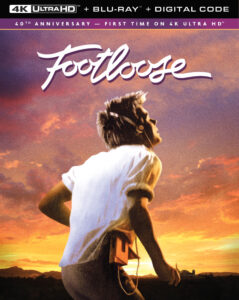 FOOTLOOSE 4K Ultra HD/Blu-Ray (107 mins., 1984, PG; Paramount): A year after “Flashdance” hit it big, Herbert Ross notched a success with another Paramount quasi-musical: “Footloose,” the Kevin Bacon turns-a-repressed-town-into-rock-n-rollers musical that also boasted a smash hit soundtrack.
FOOTLOOSE 4K Ultra HD/Blu-Ray (107 mins., 1984, PG; Paramount): A year after “Flashdance” hit it big, Herbert Ross notched a success with another Paramount quasi-musical: “Footloose,” the Kevin Bacon turns-a-repressed-town-into-rock-n-rollers musical that also boasted a smash hit soundtrack.
Bacon plays a big city kid who moves to the sticks with his mom, only to find out that dancing in Hickville is strictly prohibited. Minister John Lithgow is among the moral majority leading the charge to ban dancing, only to find out his out-of-control daughter (Lori Singer, whose appeal I’ve never been able to figure out) is — gasp — no longer a virgin! Lithgow’s rantings about the evils of rock & roll, drugs and drinking are really just a facade for a man still grieving over the loss of his own son in a car accident, so leave it to Bacon to strut his stuff – and win them over – thanks to a soundtrack filled with memorable Kenny Loggins and Deniece Williams tunes (including the classic “Let’s Hear It For The Boy”).
Granted, Dean Pitchford’s script is wallowing in nearly as many cliches as “Staying Alive” and “Flashdance” combined, but at least there’s a sincerity in the performances of Bacon and Lithgow, even though the minister’s predictable turn towards the teenagers’ sides is a little too quick in coming. Ross, meanwhile, does a terrific job directing the cast, which also includes Dianne Weist and Chris Penn.
Paramount’s 4K UHDs have been a little uneven over the last couple of years but this Dolby Vision HDR presentation is pretty solid, offering strong detail and color. The 5.1 DTS MA track is the same as heard on previous discs with a Digital code and Blu-Ray incorporating a Making Of with multiple commentaries (from Dean Pitchford and Craig Zadan, with another by Kevin Bacon) also present.
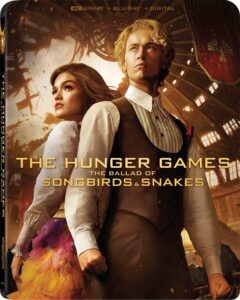 THE HUNGER GAMES: THE BALLAD OF SONGBIRDS & SNAKES 4K Ultra HD/Blu-Ray (157 mins., 2023, PG-13; Lionsgate): Prequel to the Suzanne Collins book series/Jennifer Lawrence movie franchise fared surprisingly well in theaters late last year. Bringing back director Francis Lawrence, who helmed the last two series entries, “Songbirds and Snakes” is set in the post-war Capitol, where Tom Blyth’s Coriolanus takes a tribute (Rachel Zegler) from District 12, only to have her win over Panem and his crowd. The duo end up working together with Zegler’s heroine bearing some aspects, expectedly, of a certain Katniss Everdeen, yet the movie doesn’t quite repeat itself as Collins and writers Michael Lessile and Michael Arndt have “something new to say” about a world that seemingly requires fascism in order to survive.
THE HUNGER GAMES: THE BALLAD OF SONGBIRDS & SNAKES 4K Ultra HD/Blu-Ray (157 mins., 2023, PG-13; Lionsgate): Prequel to the Suzanne Collins book series/Jennifer Lawrence movie franchise fared surprisingly well in theaters late last year. Bringing back director Francis Lawrence, who helmed the last two series entries, “Songbirds and Snakes” is set in the post-war Capitol, where Tom Blyth’s Coriolanus takes a tribute (Rachel Zegler) from District 12, only to have her win over Panem and his crowd. The duo end up working together with Zegler’s heroine bearing some aspects, expectedly, of a certain Katniss Everdeen, yet the movie doesn’t quite repeat itself as Collins and writers Michael Lessile and Michael Arndt have “something new to say” about a world that seemingly requires fascism in order to survive.
Boasting quite a bit of “country” elements and also a lot of music, playing to Zegler’s strengths, “Songbirds & Snakes,” like its predecessors, will likely prove to be too long and drawn out for casual viewers, but at this stage it’s hard to envision anyone other than fans being part of this film’s core audience to begin with. On its own terms this is a well-made film bringing back several key contributors from its cinematic predecessors including composer James Newton Howard, and the movie both looks good and is adequately performed – if understandably missing Lawrence’s star power.
Lionsgate brings “Hunger Games: The Ballad of Songbirds & Snakes” to 4K Ultra HD (2.39, Dolby Atmos) this month in a combo pack with a Blu-Ray and Digital HD code also included. The disc includes a commentary with Frances Lawrence and producer Nina Jacobson, a music video, the trailer, and a mammoth, two-plus hour documentary examining how the film came together.
 Arrow New Releases
Arrow New Releases
The number of Alistair MacLean movie adaptations back in the ‘60s and ‘70s were prolific enough to basically start a sub-genre all their own. Yet not all of them were high-profile studio films, necessarily, like “The Guns of Navarone” and “When Eagles Dare,” as the bestselling author also became involved with a number of decidedly lower-scaled thrillers which met, generally, with less commercial fanfare, though many of these retain their appeal today when revisited on home video.
One of the films that falls into the latter category is FEAR IS THE KEY (104 mins., 1972, PG; Arrow), which finds Barry Newman as a determined deep sea salvage diver who gets involved in a local fracas while driving through Louisiana, wherein he kidnaps an oil heiress (Suzy Kendall) and is later entangled with the crime boss (John Vernon) her father is unwittingly associated with. Vernon’s out to pull a big score and eventually needs Newman’s help – unaware of the latter’s master plan.
Shot on location in Louisiana by a British crew including director Michael Tuchner and cinematographer Alex Thomson, and marked with a superb, effectively modulated performance from Newman, “Fear is the Key”’s ace card is also part of its problem. A lengthy car chase sequence that comprises a good chunk of the picture’s first half is its strongest asset, with Newman and Kendall fleeing Bayou cops and Roy Budd’s dazzling jazz score pounding away in the background. It’s electric early ‘70s action filmmaking, but once it ends and the plot – adapted by Robert Carrington from MacLean’s novel – kicks into gear, you can’t help but feel a sense of deflation that there’s nothing left to come that will match it.
As it turns out, if anything, the movie veers off into the other direction entirely, trying to generate suspense from unraveling Newman’s scenario of revenge and a finale that’s so “low-fi” it could have worked just as well on the radio. It’s not entirely disappointing – particularly if you’re aware of it – but when your first act is the most memorable portion, you know viewer indifference is the most probable reaction to the material as a whole.
An Anglo-EMI production initially released in the U.S. by Paramount and seldom released on home video, “Fear is the Key” debuts in the U.S. from Arrow Video in the same, solid Studio Canal master (2.35, PCM mono) previously seen in Imprint’s release last year. The scope framing looks plenty wide and the image is healthy with Thomson’s lensing being a major plus; there’s also an early appearance from Ben Kingsley as a goon working with Vernon. Arrow’s extras here include a commentary from Howard S. Berger; a visual essay by Scout Tafoya; an appreciation of Roy Budd and his score by Neil Brand; an archival featurette, “Bayou to Bray,” on the movie’s production, plus a similarly older interview with associate producer Gavrik Losey; and the trailer.
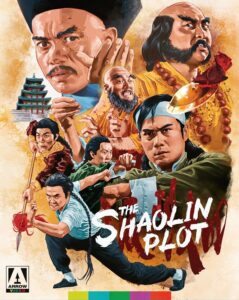 Also new from Arrow is Sammo Hung’s final film as a fight coordinator, THE SHAOLIN PLOT (110 mins., 1977), which reunites Hung with director Huang Feng and co-star star Chan Sing. This seldom-seen kung-fu import from Hong Kong’s golden era stars Sing as Prince Daglen, who sends two dangerous henchmen – including Hung’s renegade monk – to steal the only martial arts manuals he doesn’t own from a sacred temple. Regarded as a work that bridged the gap between classic kung fu and the new wave of HK genre efforts spearheaded by the likes of Hung among others, “The Shaolin Plot” ought to gain a new appreciation from fans thanks to this Fortune Star 2K restoration (2.35, mono) from original film elements in Arrow’s Blu-Ray. The usual array of Mandarin and English audio options abound here plus alternate English credits and two new commentaries: one from action movie enthusiasts Mike Leeder and Arne Venema, the other with HK movie specialists Frank Djeng and Michael Worth.
Also new from Arrow is Sammo Hung’s final film as a fight coordinator, THE SHAOLIN PLOT (110 mins., 1977), which reunites Hung with director Huang Feng and co-star star Chan Sing. This seldom-seen kung-fu import from Hong Kong’s golden era stars Sing as Prince Daglen, who sends two dangerous henchmen – including Hung’s renegade monk – to steal the only martial arts manuals he doesn’t own from a sacred temple. Regarded as a work that bridged the gap between classic kung fu and the new wave of HK genre efforts spearheaded by the likes of Hung among others, “The Shaolin Plot” ought to gain a new appreciation from fans thanks to this Fortune Star 2K restoration (2.35, mono) from original film elements in Arrow’s Blu-Ray. The usual array of Mandarin and English audio options abound here plus alternate English credits and two new commentaries: one from action movie enthusiasts Mike Leeder and Arne Venema, the other with HK movie specialists Frank Djeng and Michael Worth.
Radiance New Releases: Kohei Oguri’s THE STING OF DEATH (114 mins., 1990) is a moody, visceral film about a writer tempted to stray from his beloved wife, whom he drives mad. Nominated for the Cannes Golden Palm and a winner at multiple worldwide festivals, “The Sting of Death” is an acclaimed film meticulously restored by Radiance in a new, 3000 copy limited edition. The digital transfer (1.66, Japanese mono with English subtitles) is superior with extras including a documentary on the 1980s renaissance of Japanese cinema, featuring conversations with Oguri, Kaneto Shindo and others; a talk with historian Hideki Maeda; a limited-edition booklet and more.
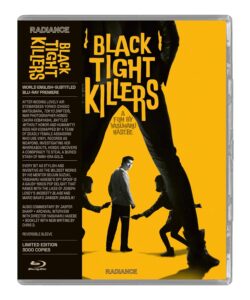 Also newly available from Radiance, GOODBYE & AMEN (110/102 mins., 1977) is regarded as one of Italy’s top action imports from the ‘70s. Damiano Damiani helmed this story of a CIA agent having to combat a fellow colleague just before he’s assigned to overthrow an African government. As with some of the more “marketable” outings in international cinema during the ‘70s, a similarly wide net was cast including John Forsythe as the American ambassador with Tony Musante in the lead and Claudia Cardinale opposite him. It’s a stylish if convoluted affair with Radiance’s Blu-Ray (1.85, mono) including both the shorter English export version plus the subtitled, longer, original Italian cut, each in a new restoration from the original camera negative. Supplements here offer Nathaniel Thompson and Howard S. Berger’s commentary; a new interview with editor Antonio Siciliano; archival interview with co-star Wolfango Soldati; booklet notes and improved subtitle translations.
Also newly available from Radiance, GOODBYE & AMEN (110/102 mins., 1977) is regarded as one of Italy’s top action imports from the ‘70s. Damiano Damiani helmed this story of a CIA agent having to combat a fellow colleague just before he’s assigned to overthrow an African government. As with some of the more “marketable” outings in international cinema during the ‘70s, a similarly wide net was cast including John Forsythe as the American ambassador with Tony Musante in the lead and Claudia Cardinale opposite him. It’s a stylish if convoluted affair with Radiance’s Blu-Ray (1.85, mono) including both the shorter English export version plus the subtitled, longer, original Italian cut, each in a new restoration from the original camera negative. Supplements here offer Nathaniel Thompson and Howard S. Berger’s commentary; a new interview with editor Antonio Siciliano; archival interview with co-star Wolfango Soldati; booklet notes and improved subtitle translations.
Coming later this month from Radiance, ALLONSANFA’N (112 mins., 1974) stars Marcello Mastroianni in Paolo and Vittorio Taviani’s political thriller as a revolutionary, unwilling to truly support his cause, who becomes involved in an uprising in southern Italy. Ennio Morricone scored with Lea Massari and Claudio Cassinelli co-starring in a film focused on 19th century Italian history which only found U.S. distribution in the 1980s. Still, the picture should appeal to aficionados of its star as well as the Taviani brothers. Radiance’s 3000-copy Blu-Ray limited edition (1.66, Italian mono with English subtitles) includes commentary by critic Michael Brooke; an archival interview by critic Gideon Bachmann with Paolo Taviani and other leading Italian filmmakers of their time; trailers, a limited edition booklet and new English subtitles.
Yasuharu Hasebe’s BLACK TIGHT KILLERS (87 mins., 1966) is an entertaining spy spoof from the mid ‘60s, shot in anamorphic widescreen with Akira Kobayashi’s war photographer out to save a kidnapped stewardess (Cheiko Matsubara) taken in by a group of female assassins – who use record LPs as their weapon of choice! Colorful literally in every way. This engaging picture (2.28, Japanese mono with English subtitles) debuts on Blu-Ray in a 3000 copy limited edition with extras including Jasper Sharp’s commentary; an archival interview with Hasebe; booklet with Chris D.’s writing; new subtitles and Radiance’s customary booklet notes.
 Catalog Rundown
Catalog Rundown
THE ABBOTT AND COSTELLO SHOW Season 2 Blu-Ray (676 mins., 1953-54; ClassicFlix): After “Meet”-ing with the Universal Monsters and Boris Karloff during the mid to late ’40s, Bud Abbott and Lou Costello decided to branch out a little on their own. The legendary comic duo independently produced several movies in addition to dabbling in the new medium of television during the early ’50s. Their initial appearances on “The Colgate Comedy Hour” – where the boys performed many of their classic vaudeville routines – lead to a regular syndicated series which launched in major markets during the Fall of 1952.
These shows were hugely popular, though by the time I was growing up in the ’80s – with many Abbott & Costello films a staple of Saturday afternoon programming along with Godzilla and friends – “The Abbott & Costello Show” was much harder to find. What’s more, the source elements for the series had seemingly gone missing, leading to inferior home video releases and broadcasts with edits and poor picture quality.
Restored by ClassicFlix and the 3-D Film Archive, the second season of “The Abbott & Costello Show” once again finds Bob Furmanek and team restoring the series via original 35mm master elements. All 26 episodes are on tap, and it’s a different comedic blend than its predecessor: eschewing the first season’s mix of vignettes and A&C routines, Season 2 is structured more tightly, following the boys around in plot-driven episodes minus most of the first season’s supporting cast. The show also moved to Motion Picture Center Studios which provided a different look to the series.
While “The Abbott & Costello Show” would conclude its run here at the end of its sophomore frame, the episodes that were produced lived on in syndicated reruns for decades thereafter, though never looking like ClassicFlix’s Blu-Ray release. The 1080p transfers (1.33, mono) are tremendous once again with enlightening extras including commentaries by Stu Fink and Ron Palumbo; a bonus content reel featuring the first section of the episode “Vacation” without an audience; a Season 1 edited scene restoration; Campbell’s Soup promo and EZ Pop vintage commercials; The “Star Reporters” lost episode; and Season 2 and “mystery” themes. Highly recommended!
 THE SWISS CONSPIRACY Blu-Ray (87 mins., 1976; Film Masters): Film Masters rolls out another unusual restoration this month – the kind of movie produced outside the Hollywood studio system back in the ‘70s with name stars mostly past their prime. Case in point: David Janssen taking the leading role in “The Swiss Conspiracy,” a fetching minor action-adventure with Janssen as a security consultant called in to help Swiss banks whose high roller (and supposedly anonymous) clients are being blackmailed.
THE SWISS CONSPIRACY Blu-Ray (87 mins., 1976; Film Masters): Film Masters rolls out another unusual restoration this month – the kind of movie produced outside the Hollywood studio system back in the ‘70s with name stars mostly past their prime. Case in point: David Janssen taking the leading role in “The Swiss Conspiracy,” a fetching minor action-adventure with Janssen as a security consultant called in to help Swiss banks whose high roller (and supposedly anonymous) clients are being blackmailed.
Universal vet Jack Arnold helmed this location-lensed picture that’s as much fun for its travelogue components as its script, which the movie doesn’t even seem that interested in, the by-the-numbers, convoluted premise being poorly developed. At least the few action set-pieces liven things up, as does the international cast – Senta Berger, John Ireland, John Saxon, Ray Milland, Elke Sommer – and a groovy Klaus Doldinger score with a hilarious main theme. Aficionados of ‘70s cinema and this kind of property – the sort that would show up on the CBS Late Movie – should get a kick out of it.
Film Masters’ Blu-Ray (1.85, mono) hails from a 4K scan of 35mm archival elements – the result is a mostly good looking image only let down by some digital noise reduction being employed. Extras include a commentary by historian Robert Kelly and Daniel Budnik; Ballyhoo’s documentary, “Jack Arnold: The Lost Years”; a video essay by Will Dodson and Ryan Verrill; and liner notes written by Lee Pfeiffer that put the movie’s low-key charms in the proper viewing perspective.
HOLLOW MAN Steelbook Blu-Ray [Director’s Cut] (118 mins., 2000, R; Mill Creek): Paul Verhoeven’s last excursion into sci-fi/fantasy was this slickly-made, albeit claustrophobic, modern update of “The Invisible Man,” with a cardboard script and dialogue off-setting whatever attempts “Hollow Man” makes to be more than just a special effects show.
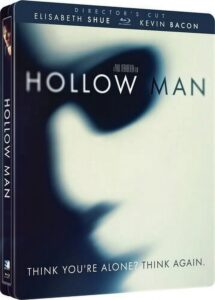 Kevin Bacon plays the title character – a cocky, arrogant scientist who decides to use himself as a human guinea pig for invisible experimentation. Soon enough the formula works, and Bacon goes batty, escaping from his lab of scientific cohorts (including Elisabeth Shue and several performers best known for their work on TV shows, like Joey “The Single Guy” Slotnick and J.J. Abrams staple Greg Grunberg) and generally causing minor inconveniences for an unsuspecting populace, including murder and an apparent rape.
Kevin Bacon plays the title character – a cocky, arrogant scientist who decides to use himself as a human guinea pig for invisible experimentation. Soon enough the formula works, and Bacon goes batty, escaping from his lab of scientific cohorts (including Elisabeth Shue and several performers best known for their work on TV shows, like Joey “The Single Guy” Slotnick and J.J. Abrams staple Greg Grunberg) and generally causing minor inconveniences for an unsuspecting populace, including murder and an apparent rape.
Though several sequences are polished and the movie’s fiery climax is fun if not totally derivative, “Hollow Man” is ultimately undone by a pedestrian script, filled with poor dialogue and badly-drawn protagonists. Bacon and Shue are as good as can be expected, but the stars of the movie are the copious special effects and Verhoeven’s set-pieces, which don’t click anywhere near as well as they did in his previous outing, the underrated and hilarious “Starship Troopers.” Part of the problem is the film’s look: shot mostly on one set, the movie has a closed-in feeling that only accentuates how thin the main material is.
Jerry Goldsmith’s score works just fine (ranking as one of his more effective later works), and even though the movie isn’t quite as bad as its reviews at the time would have you believe, there’s just something hollow about the lack of drama in “Hollow Man” that no amount of technical wizardry can overcome.
Mill Creek’s new Blu-Ray Steelbook edition includes a solid 1080p (1.85) transfer with 5.1 DTS MA sound. There’s even a new feature – an interview with Jeff Bond – that’s included on the supplemental side.
ANACONDA Steelbook Blu-Ray (89 mins., 1997, PG-13; Mill Creek): Enjoyable creature feature finds a film crew heading deep into the Amazon to document a lost civilization, only to run into a charismatic guide who has an agenda of his own: namely, finding an elusive, giant Anaconda that’s a whopper of a man-eater!
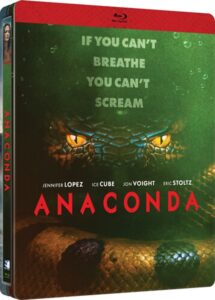 “Anaconda” sounds like every bad Sci-Fi Channel original movie, and indeed it ultimately inspired a slew of bad cable sequels. Yet the 1997 original is an entertaining slice of guilty pleasure genre fun — thanks almost entirely to its cast. Jon Voight hams it up to a level even Jonas Hodges would be proud of as the local hunter who knows all about the big snake, while Jennifer Lopez – back before she completely became a diva – is perfectly fine as the reluctant heroine (and documentary film director!) who joins forces with Ice Cube in taking the creature down. Owen Wilson, Kari Wuhrer, and Eric Stoltz co-star in director Louis Llosa’s monster flick (which took in nearly $65 million at the box-office), which gets an additional charge out of Bill Butler’s cinematography and Randy Edelman’s decent score. “Anaconda” is no “Jaws” but it’s fun for the minor-league frightfest that it is, and the cast gives it an additional, enduring appeal.
“Anaconda” sounds like every bad Sci-Fi Channel original movie, and indeed it ultimately inspired a slew of bad cable sequels. Yet the 1997 original is an entertaining slice of guilty pleasure genre fun — thanks almost entirely to its cast. Jon Voight hams it up to a level even Jonas Hodges would be proud of as the local hunter who knows all about the big snake, while Jennifer Lopez – back before she completely became a diva – is perfectly fine as the reluctant heroine (and documentary film director!) who joins forces with Ice Cube in taking the creature down. Owen Wilson, Kari Wuhrer, and Eric Stoltz co-star in director Louis Llosa’s monster flick (which took in nearly $65 million at the box-office), which gets an additional charge out of Bill Butler’s cinematography and Randy Edelman’s decent score. “Anaconda” is no “Jaws” but it’s fun for the minor-league frightfest that it is, and the cast gives it an additional, enduring appeal.
Mill Creek’s Blu-Ray Steelbook, exclusive to Walmart for the time being, includes a 1080p (2.35) transfer with 5.1 DTS MA sound and a new interview with director Louis Llosa.
TENACIOUS D IN THE PICK OF DESTINY Blu-Ray (94 mins., 2006, R; Shout! Factory): Jack Black was able to parlay his big-screen success into this feature length, quasi-vanity project that reunites Black with his “Tenacious D” mate Kyle Gass. The duo also co-wrote, with director Liam Lynch, this comical rock odyssey that finds the boys on a hunt for a mythical Pick that can turn any rocker into a bona-fide legend. Loads of cameos make this a breezy view, even if plays like a belated “Bill & Ted” sequel, the movie failing to find much of an audience outside the small screen. Shout Select’s Blu-Ray (1.85, 5.1 DTS MA) includes commentaries with Black and Gass, with another commentary from Lynch; deleted/extended scenes; archival featurettes; home videos; internet shorts; a music video and trailers.
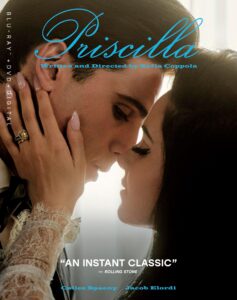 Quick Takes
Quick Takes
PRISCILLA Blu-Ray (113 mins., 2023, R; Lionsgate): There weren’t many takers last year for Sofia Coppola’s portrait of Priscilla Beaulieu (Cailee Spaeny) and her relationship with one Elvis Presley (Jacob Elordi), as captured in Priscilla’s own book “Elvis and Me” (previously made as a 1988 TV movie). This inert movie version is a bit dreamy and uneven, trying to take a different POV than most Elvis films by focusing on her perspective, yet “Priscilla” doesn’t leave you feeling as if you’ve learned a whole lot – especially for anyone familiar with The King – despite Spaeny’s capable performance. Lionsgate’s Blu-Ray (1.85, 5.1 DTS MA) of the A24 release does look attractive and includes Liv McNeil’s “The Making of Priscilla,” a featurette, the trailer, a DVD and Digital HD code.
BLACK MASS Blu-Ray (82 mins., 2023; Cleopatra/MVD): Devanny Pinn’s indie horror is set during the winter of 1978 where infamous serial killer Ted Bundy committed what would be his final series of murders, taking the lives of several unsuspecting, sleeping Florida St. co-eds. Unnerving and relatively well-made but obviously not for every taste. Cleopatra’s Blu-Ray is out February 27th (2.39, 5.1) featuring the trailer.
NEXT TIME: LEVIATHAN, KINDERGARTEN COP and more Kino Lorber new releases! Until then, don’t forget to drop in on the official Aisle Seat Message Boards and direct any emails to our email address. Cheers everyone!
